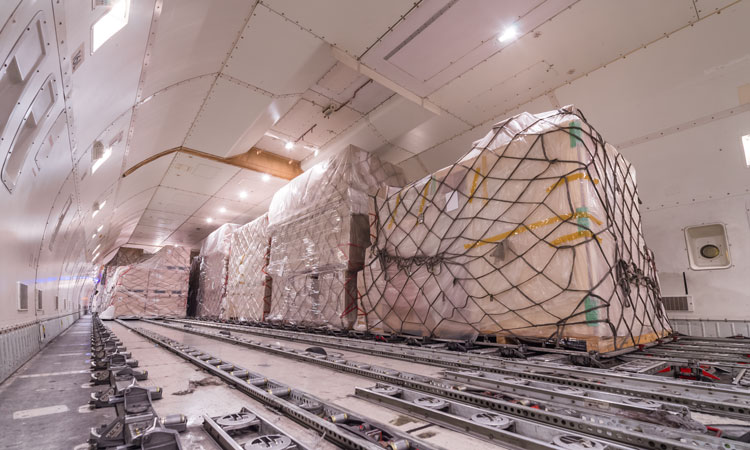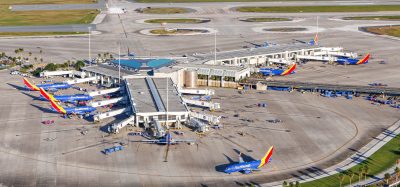Severe capacity shortfall demonstrated in air cargo performance during March
Posted: 29 April 2020 | International Airport Review | No comments yet
Global demand for air cargo, measured in cargo tonne kilometres (CTKs), fell by 15.2 per cent in March compared to the previous year, IATA reports.


IATA’s figures have illustrated the decreasing demand and capacity for air cargo due to COVID-19. However, global capacity, measured in available cargo tonne kilometres (ACTKs), shrank by 22.7 per cent in March compared to the previous year – which is a considerably bigger decrease in comparison to the demand (15.2 per cent).
International markets account for 87 per cent of air cargo. Belly capacity for international air cargo shrank by 43.7 per cent in March compared to the previous year. This was partially offset by a 6.2 per cent increase in capacity through expanded use of freighter aircraft.
“At present, we don’t have enough capacity to meet the remaining demand for air cargo. The gap must be addressed quickly because vital supplies must get to where they are needed most. For example, there is a doubling of demand for pharmaceutical shipments that are critical to this crisis. With most of the passenger fleet sitting idle, airlines are doing their best to meet demand by adding freighter services, including adapting passenger aircraft to all-cargo activity. But mounting these special operations continues to face bureaucratic hurdles. Governments must cut the red tape needed to approve special flights and ensure safe and efficient facilitation of crew,” said Alexandre de Juniac, IATA’s Director General and CEO.
Join us live: Shaping the Next Generation of Hold Baggage and Air Cargo Screening
Join us live for an insightful webinar on 11th December at 14:00 GMT, in collaboration with Smiths Detection, as we explore the strategic balance of operational efficiency, regulatory compliance, and sustainability in high-volume security environments.
This session offers a focused look into future-proofing your security strategy.
Key learning points
- Cost Reduction: Strategies to minimize bag travel time while simultaneously reducing operational costs.
- Regulatory Roadmap: Insights into the next wave of regulatory changes and their impact on future investment decisions.
- Sustainable Systems: Practical approaches to building sustainability into security systems and lowering the total cost of ownership (TCO).
- Scalable Solutions: Real-world examples of scalable systems supporting current airport growth and preparing for tomorrow.
Register now for expert insights, case studies, and actionable strategies on operational efficiency!
There are still many delays in getting charter permits issued, a lack of exemptions on COVID-19 testing for air cargo crew and inadequate ground infrastructure to/from and within airport environments. Air cargo needs to move efficiently throughout the entire supply chain to be effective. As a result, IATA has urged governments to:
- Cut the paperwork for charter operations
- Exempt cargo crew from quarantine rules that apply to the general population
- Ensure there is adequate staff and facilities to process cargo efficiently.
While there is an immediate capacity shortage, the collapsing economy is expected to further depress overall cargo volumes.
Short-term analysis shows that global manufacturing activity continued to contract in March as government-imposed lockdowns caused widespread disruptions.
Looking at the prospects for the rest of 2020, the World Trade Organization forecast gives little indication of a quick recovery. The optimistic scenario is for a 13 per cent fall in trade in 2020, while the pessimistic scenario sees a 32 per cent fall in trade in 2020. This will deeply impact air cargo’s prospects.
One area of demand, however, is growing sharply. Pharmaceutical shipments are tracking at double previous-year volumes. This excludes shipments of medical equipment.
“The capacity crunch will, unfortunately, be a temporary problem. The recession will likely hit air cargo at least as severely as it does the rest of the economy. To keep the supply chain moving to meet what demand might exist, airlines must be financially viable. The need for financial relief for airlines by whatever means possible remains urgent,” said de Juniac.
Join our free webinar: Revolutionising India’s travel experience through the Digi Yatra biometric programme.
Air travel is booming, and airports worldwide need to move passengers faster and more efficiently. Join the Digi Yatra Foundation and IDEMIA to discover how this groundbreaking initiative has already enabled over 60 million seamless domestic journeys using biometric identity management.
Date: 16 Dec | Time: 09:00 GMT
rEGISTER NOW TO SECURE YOUR SPOT
Can’t attend live? No worries – register to receive the recording post-event.
Related topics
Air freight and cargo, Airport crisis management, Capacity, COVID-19, Economy

















